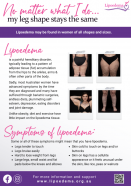If you're a frequent visitor to Healthify, why not share our site with a friend? Don't forget you can also browse Healthify without using your phone data.
Lipoedema
Key points about lipoedema
- Lipoedema is an abnormal build-up of fat cells on your hips, legs, buttocks and sometimes arms.
- It can be mistaken for obesity, but it occurs in people who are not overweight as well as those who are. It can also be mistaken for lymphoedema.
- Lipoedema mostly affects women and generally develops when your hormones are changing.
- It can cause swelling and pain.
- Although it cannot be cured, treatment can slow its development, so getting an early diagnosis helps you manage this condition.
- It's not a commonly known condition so if you think you have the symptoms, ask your healthcare provider whether lipoedema might be why you have specific areas of weight gain.

Lipoedema is an abnormal build-up of fat cells on your hips, legs, buttocks and sometimes arms. It can be mistaken for obesity, but it occurs in people who aren't overweight as well as those who are. It can also be mistaken for lymphoedema.
Lipoedema mostly affects women and generally develops when your hormones are changing. It can cause swelling and pain.
Although lipoedema can't be cured, treatment can slow its development, so getting an early diagnosis helps you manage this condition.
Video: 5 types of lipedema
This video may take a few moments to load.
(The Lipedema Project, US, 2015)
Health professionals are not sure what causes lipoedema but it seems to be genetic (run in families) and triggered by hormonal changes. So it is likely that you inherit the possibility of developing it and then it starts at a time when your hormones are changing, eg, at puberty, when taking the contraceptive pill, during pregnancy or at menopause. It is thought to affect about 11% of the adult female population.
The main symptom is the development of areas of fat, usually on your legs and buttocks and sometimes on your arms.
- The uneven distribution of fat makes your body look out of proportion, with your upper body being smaller than your lower body.
- Both sides of your body are equally affected but your hands and feet are not, so they remain slim.
- The affected area can be sensitive to touch or to tight clothing and may bruise easily.
- Legs may feel heavy.
- The skin over the affected area may feel cool.
- If you lose weight it comes off your upper body but not your lower body.
- Lymphoedema is a similar condition but results from a build-up of fluid rather than fat in specific areas.
- Lymphoedema can affect your feet and toes as well as your legs.
- With lymphoedema if you press your thumb into your skin it makes a dent which gradually fills in. That doesn’t happen with lipoedema.
- People with lipoedema can develop lymphoedema as well, because the build-up of fat can inhibit the flow of lymph.
Your doctor can diagnose it by physical examination and from asking about your history. There is no specific diagnostic test and there are no blood or urine (pee) markers to test for.
Things your doctor will consider include:
- the swelling being on both sides of your body but not your hands and feet
- the texture of your skin tissue in the affected areas may feel different to other areas, eg, softer and have dimples in it like a mattress
- it may be possible to feel small lumps, like peas or gravel, in the fat
- the areas may feel colder to touch
- the timing of when the fatty areas started developing – often at puberty
- attempts to lose weight haven’t worked for the affected area
- standing for a long time, hot weather and plane trips may make the swelling and pain worse
- there may be decreased strength in your lower legs
- other family members may have similar symptoms or may have been diagnosed with the condition.
There is no cure for lipoedema but there are some treatments that can help with relieving symptoms to improve your quality of life, slowing down the progression and preventing complications.
These include:
- wearing a special compression garment for support
- specialist massage to reduce pain and improve mobility
- use of an intermittent pneumatic compression (IPC) device – compression sleeves worn on the lower legs which inflate and deflate to provide a form of massage
- liposuction.
The condition will not go away and can get gradually worse. But getting a diagnosis as soon as possible and getting medical help can assist with managing the symptoms.
If you are overweight, losing weight will help with staying mobile and active. Getting heavier may make the condition worse and harder to treat. Doing gentle exercise like walking, swimming, cycling and stretching to remain fit and strengthen muscles can help. Avoid sitting still for long periods of time.
Look after your skin, making sure you wash and dry any skin folds carefully and apply suitable skin care products. If you get insect bites, cuts or abrasions keep an eye on them as you may be more likely to get skin infections in the affected areas.
If you find yourself worrying or getting depressed about your symptoms ask for help. Talk to your doctor or nurse who can refer you to a counsellor.
Apps reviewed by Healthify
You may find it useful to look at some Nutrition, exercise and weight management apps.
There is not a lot of specific support available for people in Aotearoa New Zealand with lipoedema, perhaps because of a lack of awareness of the condition.
- There is a private Lipoedema New Zealand group(external link) on Facebook.
- Many of the lymphoedema therapists(external link) also provide therapy for lipoedema.
Unfortunately it is not possible to prevent it, but there are things you can do to manage the symptoms and slow down its development.
The following links provide further information about lipoedema. Be aware that websites from other countries may have information that differs from New Zealand recommendations. In the United States the condition is known as lipedema.
A range of information and personal stories(external link) Lipoedema Australia
Information and private membership(external link) Lipoedema Warriors Facebook page
Lymph Info Trust(external link), facebook page(external link)
Apps
Nutrition, exercise and weight management apps
Resources
I'm over being told that I just need to lose weight(external link) Lipoedema Australia
No matter what I do, my leg shape stays the same(external link) Lipoedema Australia
References
- Lipoedema therapy(external link) Lymph Clinic, NZ
- The stages of lipoedema(external link) Lipoedema UK
- Ketogenic diet as a potential intervention for lipedema(external link) ScienceDirect, 2021
- Lipoedema Warriors(external link) Australia
Lipoedema – definition and pathogenesis(external link) DermNet NZ, 2020
Best practice guidelines on the management of lipoedema(external link) Wounds UK, 2017
Lipedema – a frequently misdiagnosed and misunderstood fatty deposition syndrome(external link) Wound Care Journal, 2010
The Lipedema Project(external link) provides online courses and materials. A lecture on dietary recommendations for lipoedema and lymphoedema can be found here.(external link)
Standard of care guidelines and video(external link) Lipedema Medical Solutions, US
Lymphoedema therapists(external link) also provide therapy for people with lipoedema
Apps
Brochures

Lipoedema Australia

Lipoedema Australia
Credits: Healthify editorial team. Healthify is brought to you by Health Navigator Charitable Trust.
Reviewed by: Dr Sharon Leitch, GP and Senior Lecturer, University of Otago
Last reviewed:
Page last updated:





